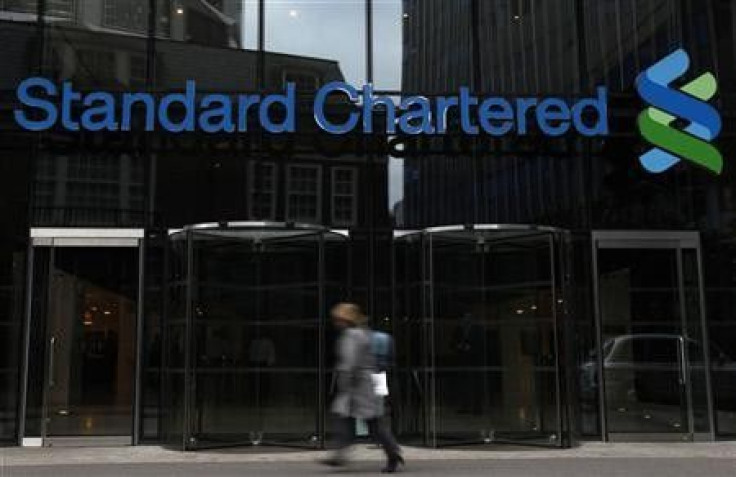Standard Chartered Reaches $340 mln Settlement over Iran

Standard Chartered Plc will pay $340 million to New York's bank regulator over transactions linked to Iran, in a speedily arranged deal likely to cheer its shareholders.
The deal with New York Superintendent of Financial Services Benjamin Lawsky still left the British bank facing a separate probe of Iran-linked transactions by other U.S. authorities.
The deal on Tuesday capped a week of transatlantic tension and a furore over why a state agency had upstaged the other authorities.
The resolution also averted a hearing on Wednesday at which the bank had been called to demonstrate why its license to do business in New York should not be revoked.
Ian Gordon, an analyst at Investec Securities in London, said that the risk of further regulatory costs "appear sufficiently contained" to allow the bank's shares to build on a rally from their lows after Lawsky brought his case last week.
"Standard Chartered's management team have conducted themselves admirably in the face of extreme provocation," Gordon said.
The bank's shares rose 2.74 percent to close at 1,370 pence on Tuesday, before Lawsky's announcement.
Lawsky on August 6 called Standard Chartered a "rogue institution" that had broken U.S. sanctions on Iran, saying it hid Iran-linked transactions with a total value of $250 billion from regulators.
Lawsky's order came like a bolt from the blue, the bank said, hitting its share price and bringing top executives hurrying back to London from vacation. Bank of England Governor Mervyn King said that Lawsky was out of step with other U.S. authorities. And Standard Chartered Chief Executive Peter Sands strongly denied the allegations, saying illegal transactions totaled less than $14 million.
In his announcement on Tuesday, Lawsky said the bank had "agreed that the conduct at issue involved transactions of at least $250 billion." But he gave no details on what protections the deal gave Standard Chartered.
Standard Chartered confirmed that the two sides had reached an agreement, including the payment of $340 million, and said detailed terms would be concluded soon.
"It was a pragmatic decision in the best interest of shareholders and customers," a spokesman for the bank said.
In addition to the civil penalty, Lawsky said the bank agreed to an outside monitor for at least two years to check on controls on money-laundering at its New York branch.
Lawsky's aggressive stance heightened his public profile just months after the Department of Financial Services, the agency he heads, was created out of the state's banking and insurance regulators.
Within minutes of the announcement, New York Governor Andrew Cuomo lauded the "effectiveness and leadership" of the new agency.
"New York needed a tough and fair regulator for the banking and insurance industries to protect consumers and investors," Cuomo said.
But Lawsky has also drawn fire by jumping ahead of a two-year probe into Standard Chartered by the U.S. Treasury, the Federal Reserve, the Justice Department, and New York prosecutors.
"It's very unfortunate this wasn't done as a global state and federal settlement," said Ed Wilson, a former senior attorney at the U.S. Treasury Department.
As negotiations with Lawsky progressed last week and this week, the bank held separate talks with other authorities. It had hoped to land a deal on both fronts, but Lawsky's solo announcement Tuesday made clear that had not happened.
Underscoring a continuing divide with Lawsky, the other authorities issued short statements saying they would continue to work together.
"Treasury will continue working with our state and federal partners to hold Standard Chartered accountable for any sanctionable activity that may have occurred," the Treasury Department said.
The U.S. Federal Reserve said it "continues to work with the other agencies on a comprehensive resolution."
The Justice Department defended its record in fighting money laundering and said it was working with its regulatory and other partners "to determine what actions might be appropriate in this matter."
The Manhattan district attorney's office also said it would continue to work with its partners on sanctions violations.
Jimmy Gurule, a former undersecretary for enforcement at the Treasury Department who is now a law professor at Notre Dame, said Lawsky may have acted out of frustration that federal regulators were moving too slowly.
"I think, in part, there was probably some exasperation, some frustration on the part of the New York state regulators of federal regulators," Gurule said.
In the end, Lawsky's office won a settlement that was on par with fines paid by a handful of other banks that had improperly done business with sanctioned states such as Iran and Cuba. In 2010, Barclays Plc paid $298 million to settle a joint probe with federal and New York authorities.
Lloyds Banking Group and Credit Suisse Group have previously agreed to pay settlements of $350 million and $536 million, respectively. ING Bank NV paid a settlement of $619 million. HSBC Holdings Plc currently is under investigation by U.S. law enforcement, according to bank regulatory filings.
© Copyright Thomson Reuters 2024. All rights reserved.











